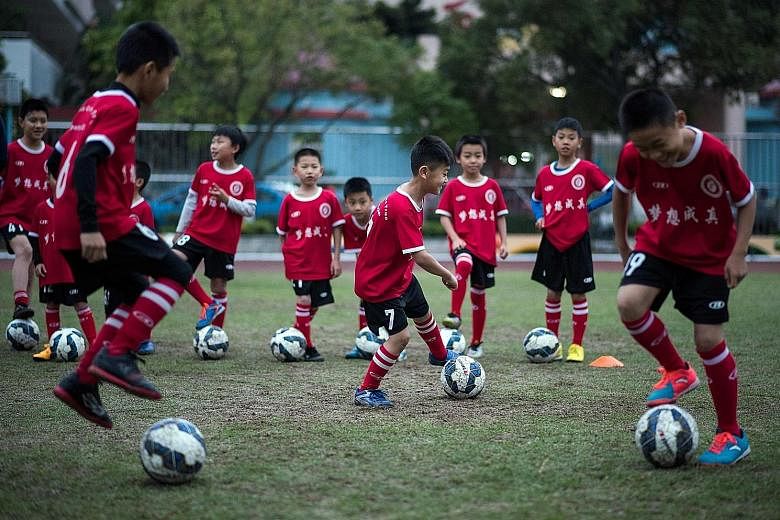KUALA LUMPUR • Fifa's decision to expand the World Cup to 48 teams will address Asia's long-standing demand for greater representation in the showpiece tournament, Asian Football Confederation president Shaikh Salman Ebrahim Al Khalifa said yesterday.
The 51-year-old Bahraini attended Tuesday's Fifa Council meeting, in which football's governing body decided to add 16 more teams to its current 32 from the 2026 edition of the tournament.
"We believe that Asia, as the biggest continent, deserves more slots compared with the current quota, looking at the economic power it has, and the popularity for the game in Asia, in addition to the huge development for football at all levels," Shaikh Salman said in a statement.
In the current format, the top four Asian teams earn direct entry, while the fifth-placed side face an inter-continental play-off.
Fifa is yet to determine the number of extra slots for each continental confederation and Shaikh Salman said the expansion would ignite fresh hopes among Asian countries to make their Finals debut.
-
How the new format will work
-
TEAMS
Increase from 32 to 48.
MATCHES
Increase from 64 to 80.
GROUP STAGE
Number of groups doubles from eight to 16, with three teams in each group - top two to go through. Four matches each day during group stage. Penalties to decide all drawn matches.
KNOCKOUT ROUNDS
Number increases from four to five. New round of 32. This is followed by the round of 16, quarter-finals, semi-finals and the final.
REACHING THE FINAL
The winner will still play seven matches.
Chinese state media said the move could help realise the country's "dream" of returning to the World Cup, while New Zealand, which looks set to be a key beneficiary, called the move "fantastic news".
Many critics have rounded on the decision, complaining it will dilute the quality of the World Cup and saying it was driven by hunger for profits and political gain.
But Sheikh Salman, president of the Asian Football Confederation (AFC), said it would have a "positive impact on Asian football".
The expansion was a key election promise of Fifa president Gianni Infantino, who beat Sheikh Salman to the post in polls early last year.
Asian countries have largely failed to make an impact at the World Cup, which is dominated by European and South American teams, although co-hosts South Korea reached the semi-finals in 2002.
In China, ranked 82nd by Fifa but which has set its sights on becoming a global football power, the official Xinhua news agency said the move represented a big opportunity after their sole 2002 appearance.
"Even if the levels of skill and strategy in the Chinese men's football do not grow in leaps and bounds by 2026, the initial objectives of football reform will have been realised," a Xinhua commentary said. "By then, with the added bonus of World Cup expansion, it is highly possible that China's return to the World Cup will no longer be just a dream."
Football Federation Australia chief executive David Gallop said Fifa's move "recognised the growth of the game outside of Europe and South America".
"As the quality of Asian football continues to improve, AFC member associations will justifiably deserve greater representation at the World Cup," he said.
Similar optimism prevailed across the Tasman Sea, with New Zealand Football (NZF) hoping the 11-team Oceania confederation would finally be spared the uncertainty of a play-off.
"We can only hope that means a direct entry as a minimum," NZF chief executive Andy Martin said. "If that is the case then that will be fantastic for the whole of Oceania."
Australia (1974 and 2006) and New Zealand (1982 and 2010) are the only sides to qualify for the World Cup Finals from Oceania. Australia subsequently joined the AFC and qualified in 2010 and 2014.
Japan coach Vahid Halilhodzic said the expansion "makes sense", while Japan Football Association chief Kozo Tashima told the local media: "We will discuss the issue... but we would hope they will be increased by one, two or three."
REUTERS, AGENCE FRANCE-PRESSE

